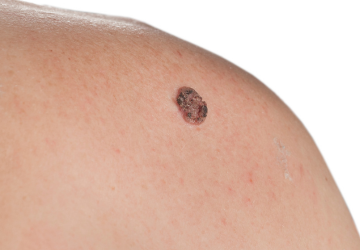
Skin Cancer Screening
by Dr. Kaitlin Tennyson
Skin cancer screening is a medical examination of the skin to look for early signs of skin cancer. It is important to have regular skin cancer screenings, especially if you have a high risk of developing skin cancer.
The American Academy of Dermatology (AAD) recommends that everyone have a skin cancer screening every year. If you have a high risk of developing skin cancer, you may need to have skin cancer screenings more often.
There are two types of skin cancer screenings:
- Self-exam: A self-exam is when you check your own skin for any changes. You should do a self-exam every month.
- Professional exam: A professional exam is when a doctor or nurse checks your skin for any changes. You should have a professional exam every year.
During a skin cancer screening, the doctor or nurse will look for any changes in the size, shape, color, or texture of your moles. They will also look for any new moles. If they find any changes that concern them, they may recommend a biopsy.
A biopsy is a procedure in which a small piece of tissue is removed from the skin for testing. The tissue is then examined under a microscope to look for cancer cells.
If you have skin cancer, early detection and treatment are important. Early detection can lead to a better outcome.

There are a number of things you can do to reduce your risk of developing skin cancer, including:
- Avoiding the sun: Avoid spending too much time in the sun, especially during the middle of the day when the sun’s rays are strongest.
- Wearing sunscreen: Wear sunscreen with an SPF of 30 or higher every day, even on cloudy days.
- Wearing protective clothing: Wear clothing that covers your skin, such as a hat, sunglasses, and long-sleeved shirts and pants.
- Seeking shade: Seek shade when you are outdoors, especially during the middle of the day.
- Avoid tanning beds: Do not use tanning beds. Tanning beds emit ultraviolet (UV) radiation, which can damage your skin and increase your risk of skin cancer.
Here are some tips for doing a self-exam:
- Use a mirror to check all of your skin, including your scalp, back, and between your toes.
- Look for any new moles or spots, or changes in existing moles or spots.
- Pay attention to the ABCDEs of skin cancer:
- Asymmetry: One half of a mole or spot is different from the other half.
- Border: The border of a mole or spot is irregular.
- Color: The color of a mole or spot is uneven.
- Diameter: A mole or spot is larger than 6 millimeters (about the size of a pencil eraser).
- Evolution: A mole or spot is changing in size, shape, or color.
Skin cancer screening is important because it can help find skin cancer early, when it is most treatable. Early detection and treatment can save lives. If you find any changes, see your doctor right away.

People who should be screened for skin cancer include:
- People with fair skin, including those with blond or red hair, blue eyes, and freckles.
- People with a family history of skin cancer.
- People who have had a lot of sunburns, especially during childhood.
- People who have had a lot of exposure to ultraviolet (UV) radiation, such as from the sun or tanning beds.
- People who have certain medical conditions, such as xeroderma pigmentosum, which makes them more susceptible to skin cancer.
- People who have had skin cancer in the past.






